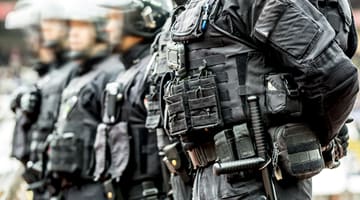The number of antisemitic attacks in the United States was at a near historic high in 2018. Significantly, physical assaults on Jews was up 105% over the previous year, according to the Anti-Defamation League’s Audit of Antisemitic Incidents – and included the deadliest attack on Jews in American history, at the Tree of Life Congregation in Pittsburgh, in October.
In 2019, the number of attacks continue to rise at alarming rates, most recently in New York.
As a community, our collective attention is focused on the resurgence of virulent antisemitism, from both the Left and the Right, and what we can do to minimize or eliminate its causes and effects. However, it is imperative that the Jewish community likewise direct its energy and resources to the immediacy of the threat. Surely, we must do everything in our power to fight antisemitism. But we must also be vigilant and proactive to protect ourselves in two very practical ways. In tandem, these vital steps can save lives.
First, we must ensure that our institutions are doing everything possible to secure their premises. This means identifying – with professional guidance – the security needs of our facilities, and implementing the resulting recommendations. It also means making certain that the people who frequent our facilities are trained in both operational security procedures and also how to respond to an active threat. If a synagogue, for example, has locked certain doors to control access to the building but congregants continue to prop open doors for convenience, then we have not done what we need to do. We cannot continue to delude ourselves into thinking that we may not be a target.
The second step is to actively pursue, and advocate for, the means to provide crucial security improvements to our communal institutions. It is the primary function of government to protect its citizens, to the maximum extent possible. We at the Orthodox Union seek to hold our elected representatives accountable for carrying out that responsibility. Together as a community, we must speak up and advocate – on the federal, state and local levels – for adequate funding for physical security, training, and security personnel for Jewish communal facilities.
For nearly 15 years, the OU has played a central role in advocating for government resources to secure our synagogues, schools and community centers against the threat of attack.
In 2005, the OU and its coalition partners spearheaded the creation of the federal Nonprofit Security Grant Program, administered by the US Department of Homeland Security. This was the first legislation in the country to provide security grants for nonprofits. To date, Congress has allocated $329 million for the program, and many of these grants have been awarded to Jewish institutions. We are now advocating to increase the program’s annual funding through 2021, as the needs continue to grow.
Further, through our advocacy efforts, the OU has been instrumental in obtaining security grant funding allocations on the state level in New York, New Jersey, Florida, Maryland, California and Pennsylvania. These programs can be used for much-needed security enhancements, special equipment, and in some states, the hiring of security personnel. We are currently advocating, with coalition partners, for a state security grant allocation in Illinois.
In the aftermath of the devastating Passover attack in Poway, the OU, along with a multi-faith coalition, sought an increase to the California State Nonprofit Security Grant Program from $500,000 to $15 million. The $15 million allocation was included in the governor’s budget, and a bill is working its way through the state legislature that would allow institutions at risk of hate-motivated violence to use program funds for security personnel in addition to security equipment and upgrades. Similarly, following the Pittsburgh attack, we launched a campaign in Pennsylvania that led to a 597% increase in allocated safety funds for nonpublic schools.
We are proud of what we have accomplished thus far, but our community cannot afford to be reactive. We must bolster security in all of our communal spaces, with equipment, security personnel, and appropriate training for staff, congregants and students. We must make our voices heard in the halls of government, putting programs into place to obtain funding to protect our institutions and those that use them. We no longer have the luxury of discussing the problem of antisemitism – we must take an active role in defending our community. The stakes are simply too high.
This article appears in the September 23rd issue of The Jerusalem Report.
